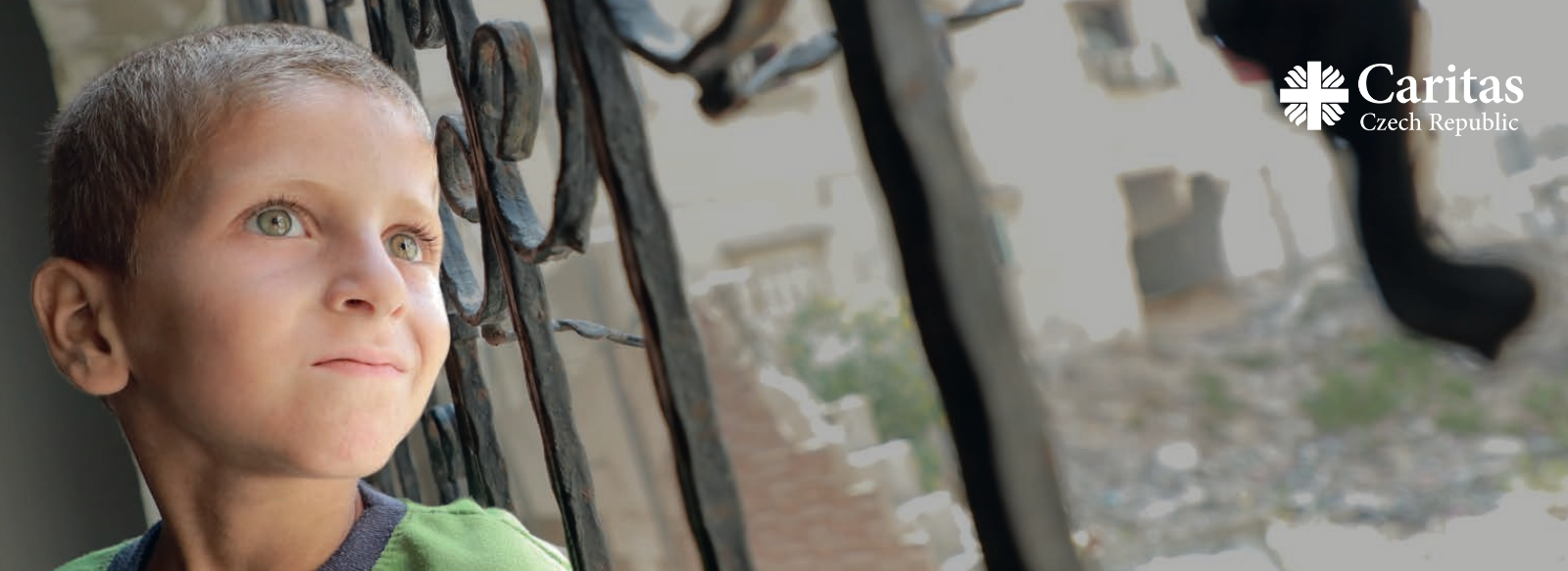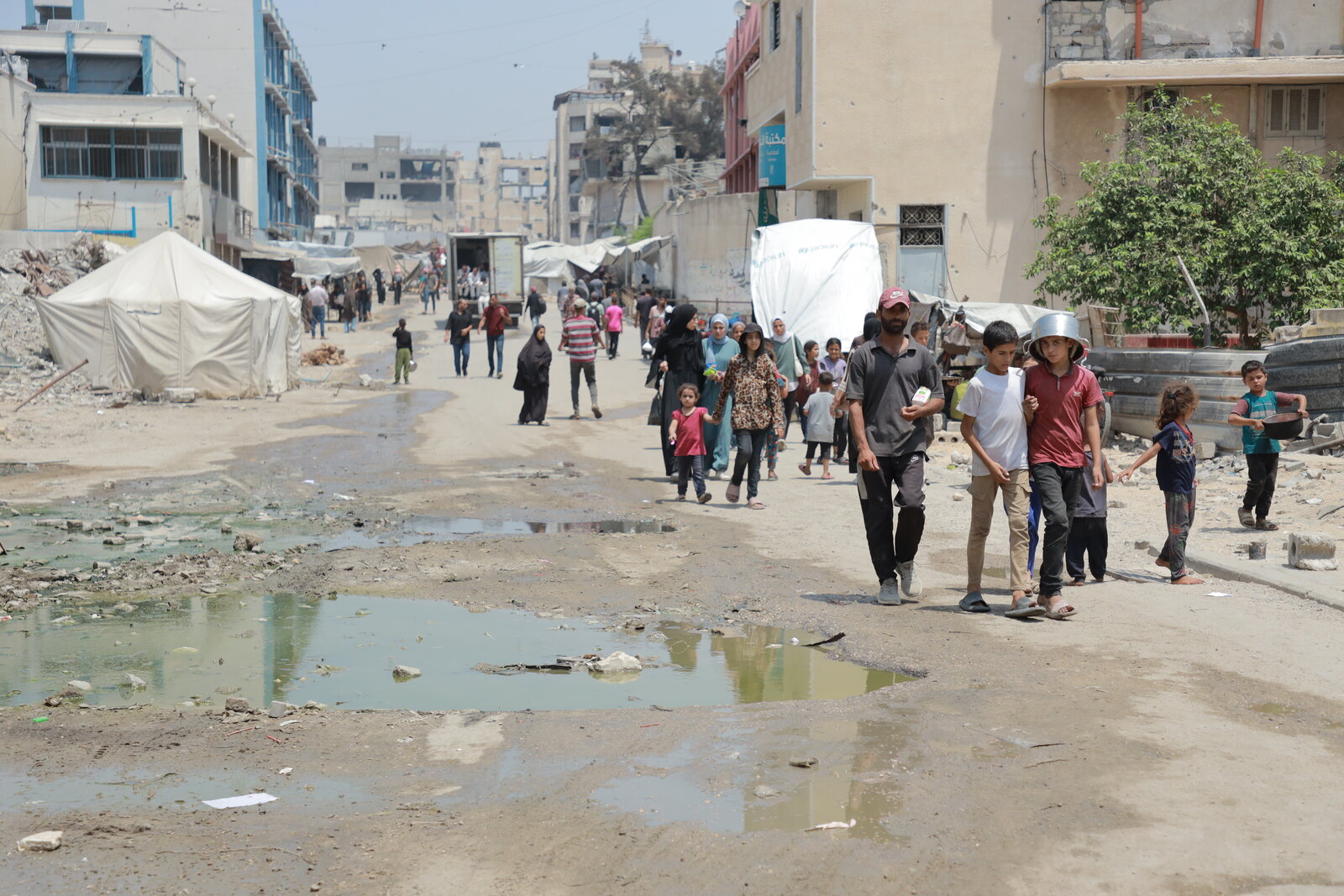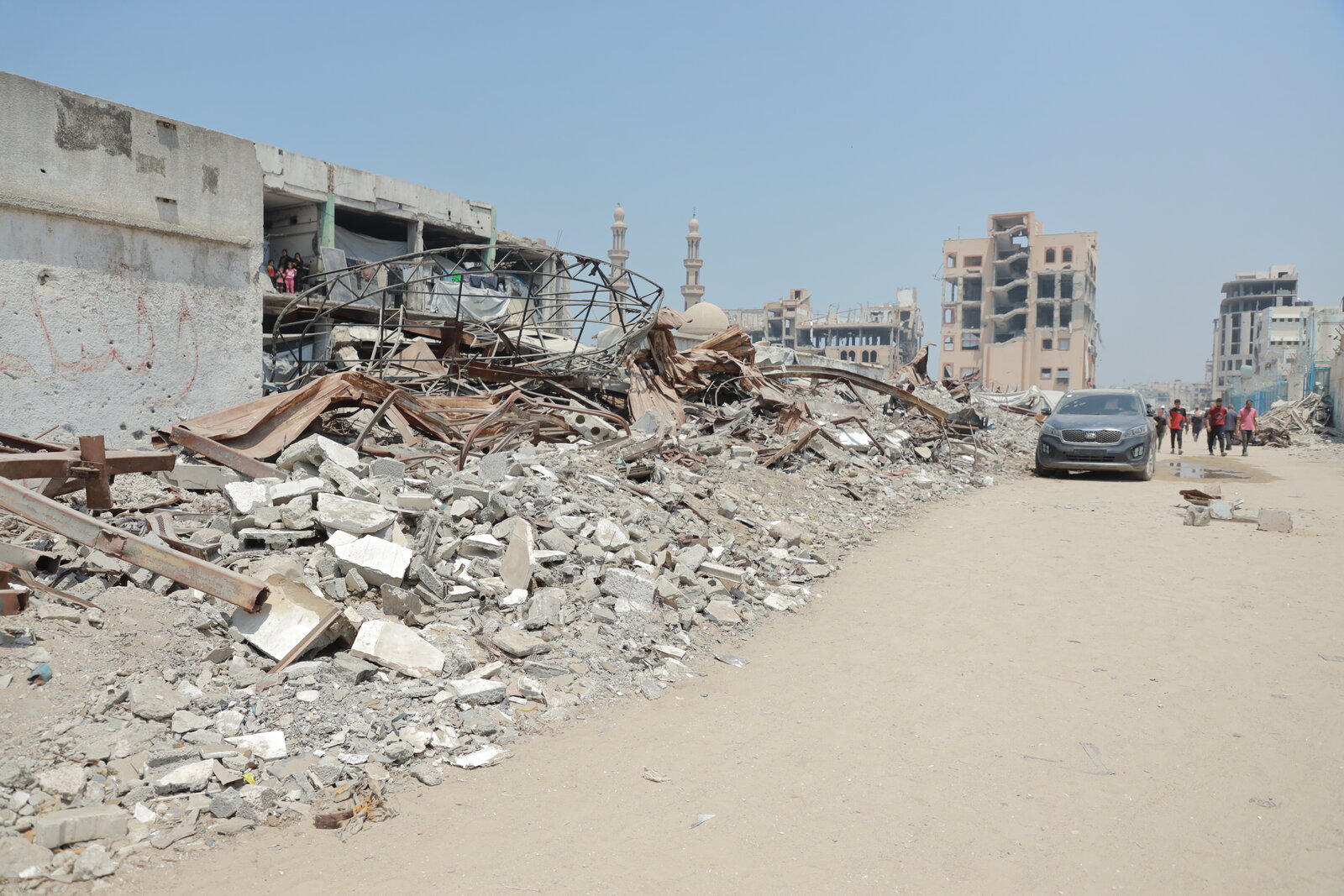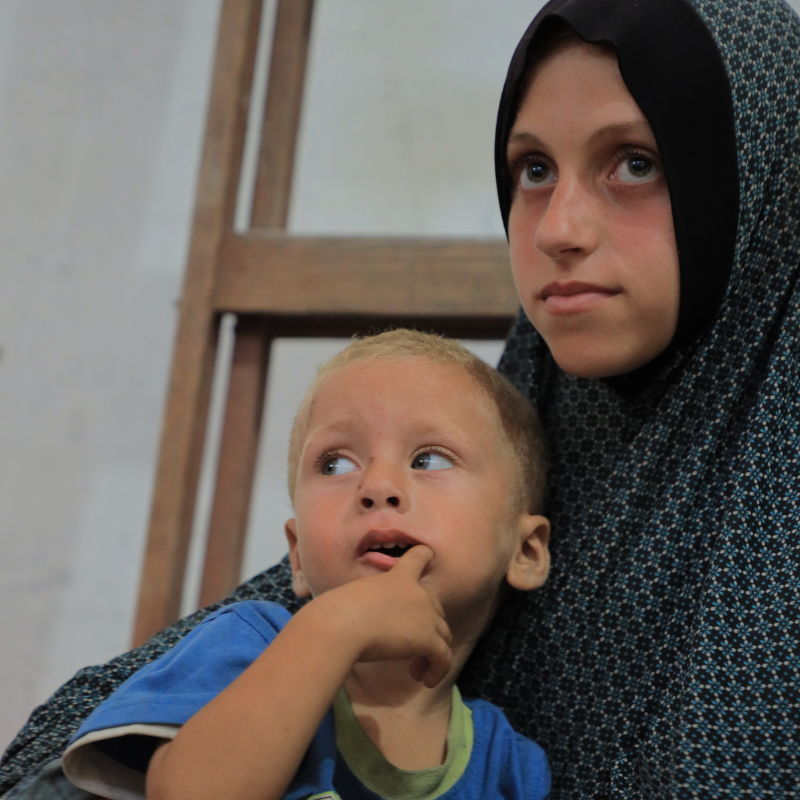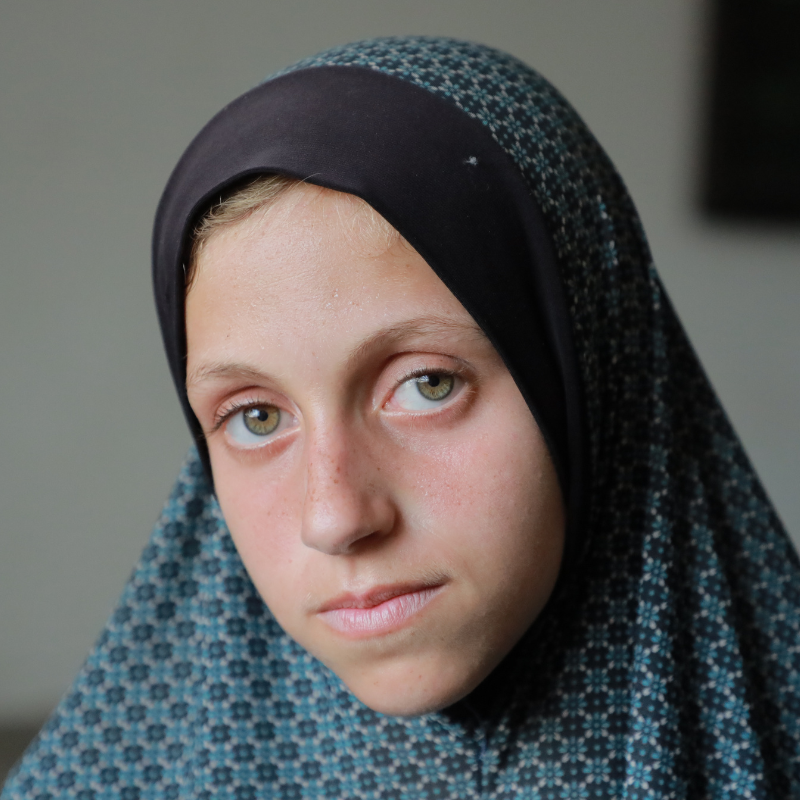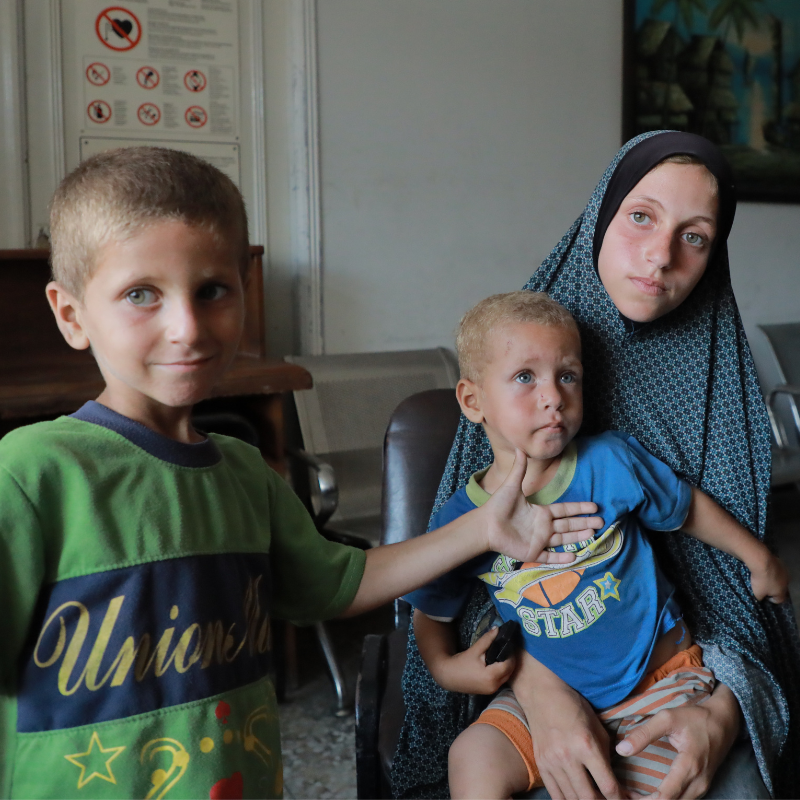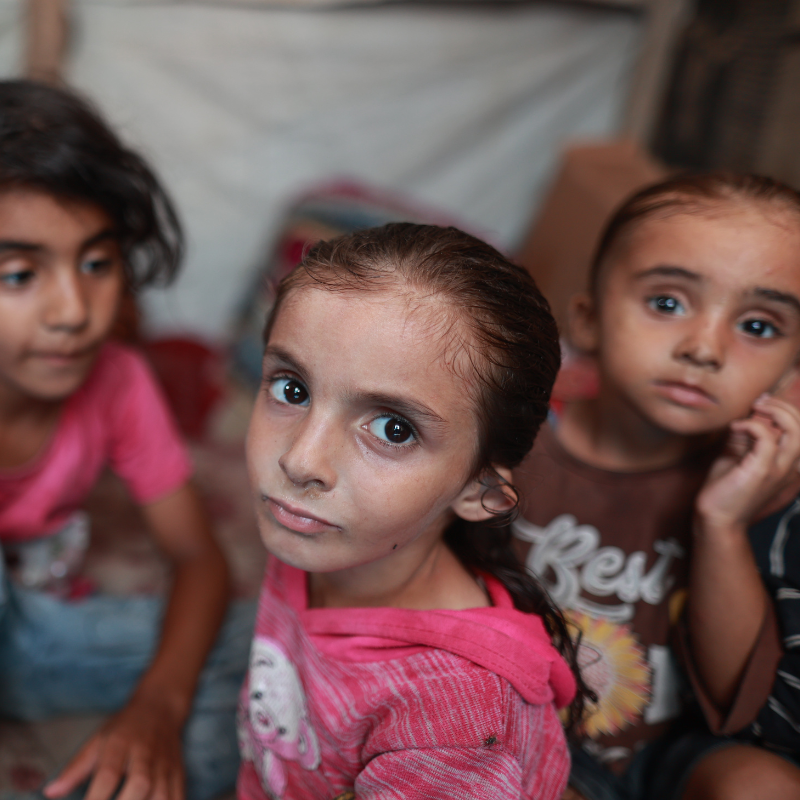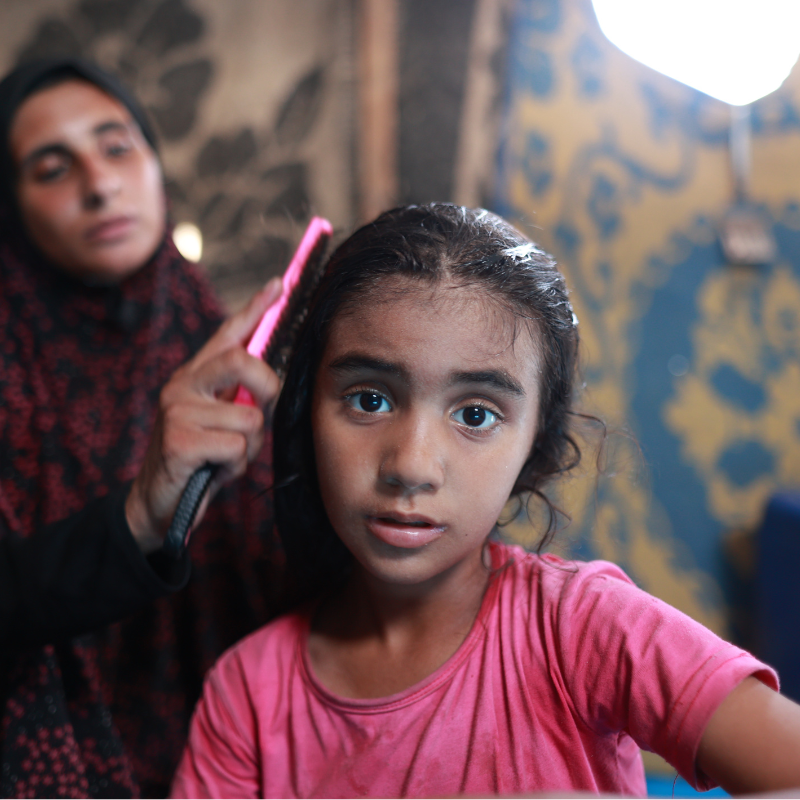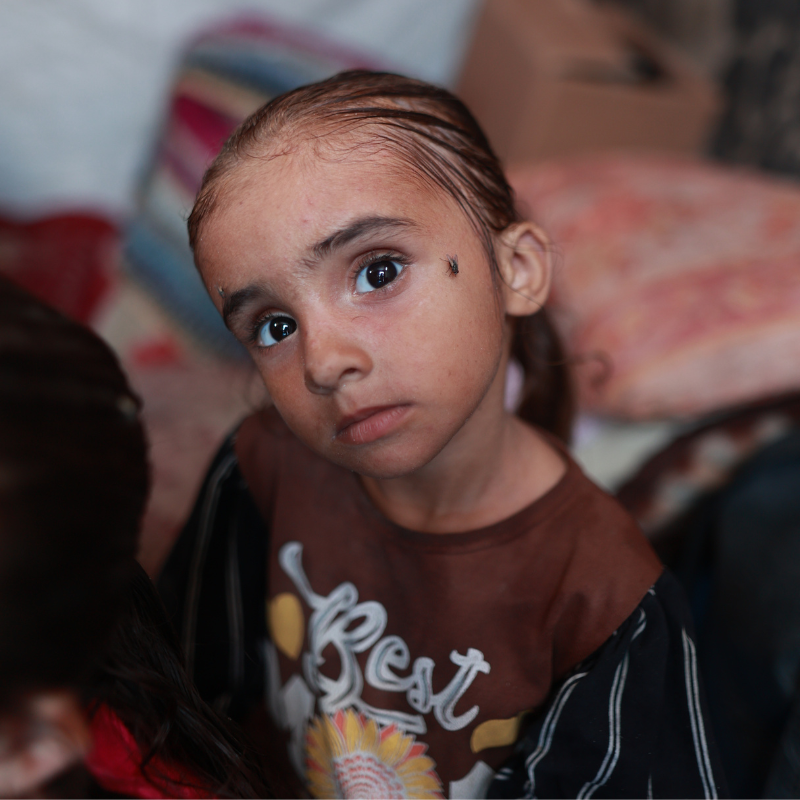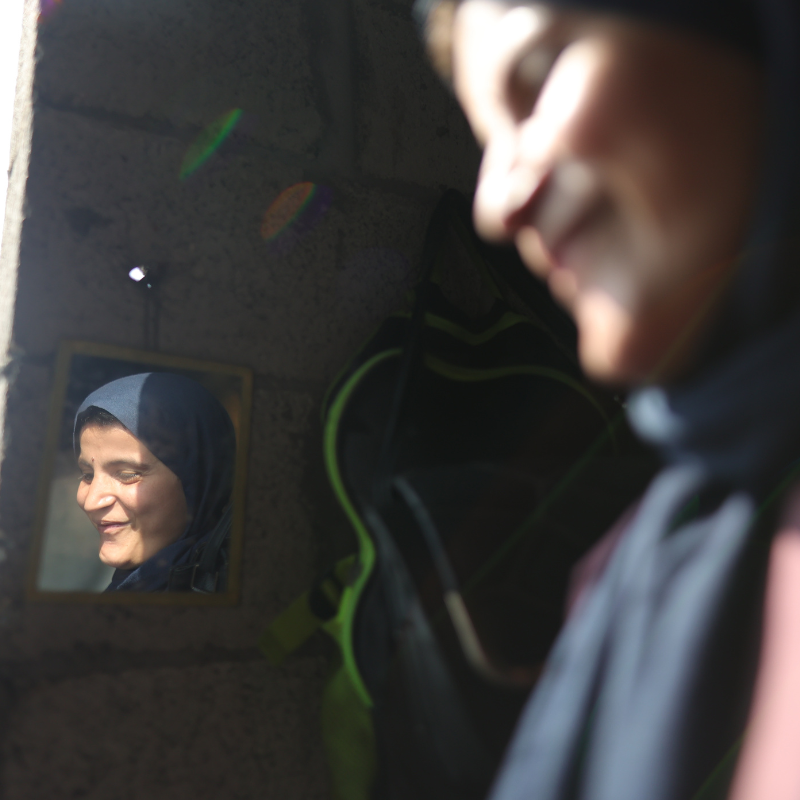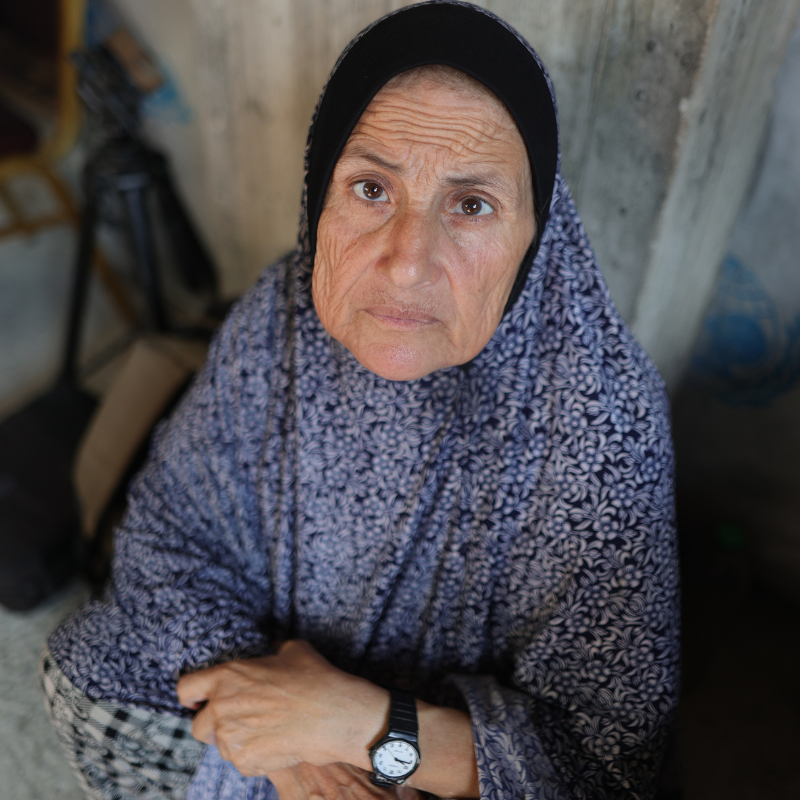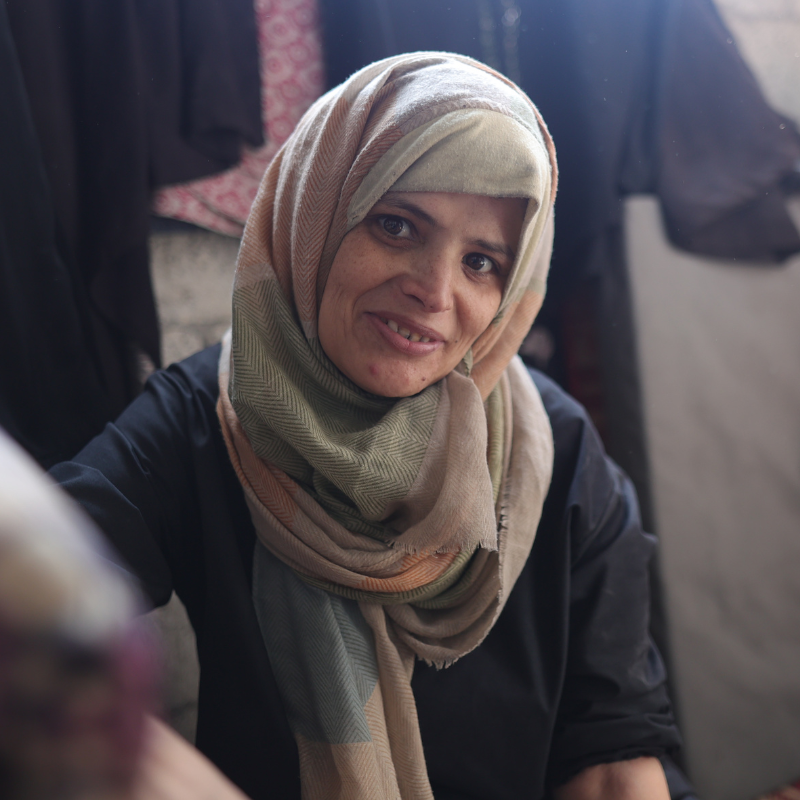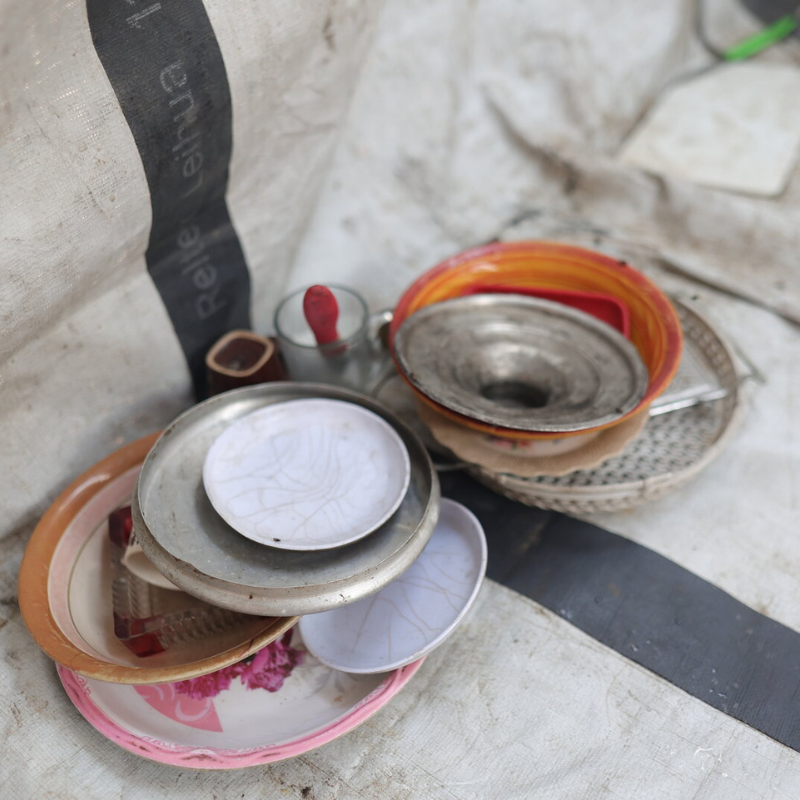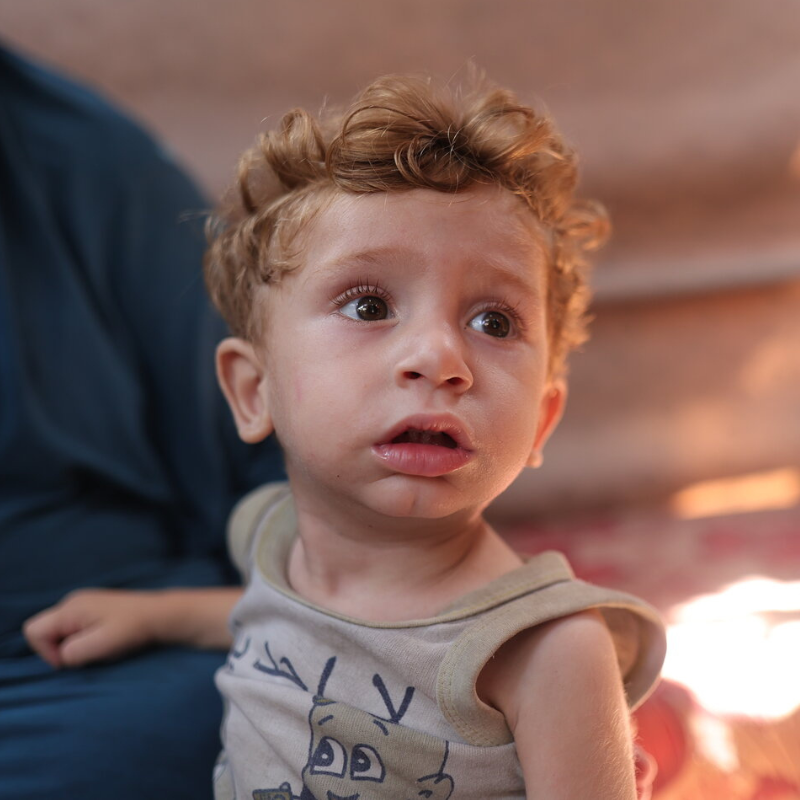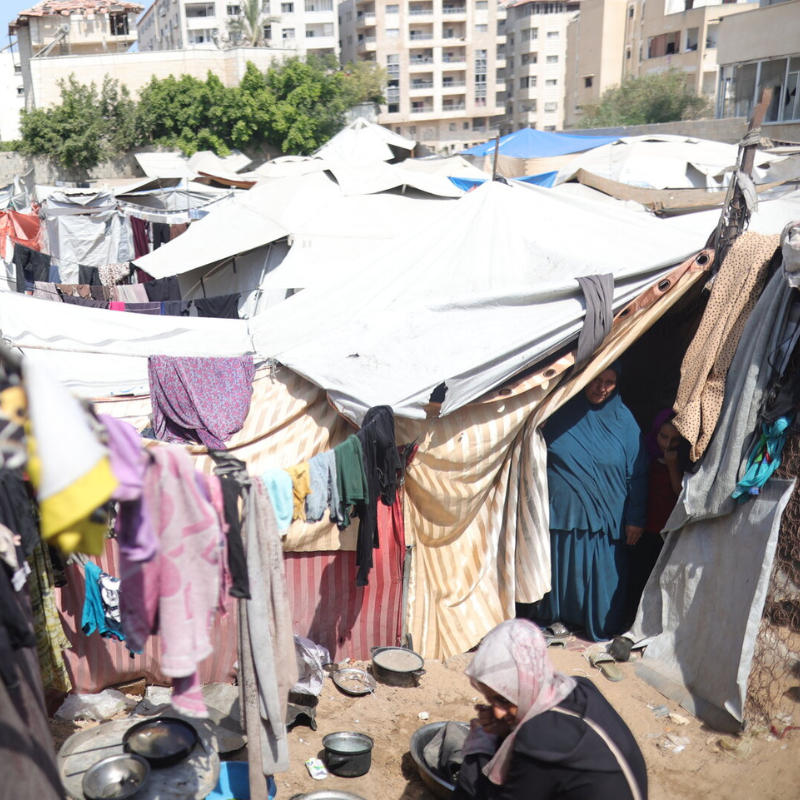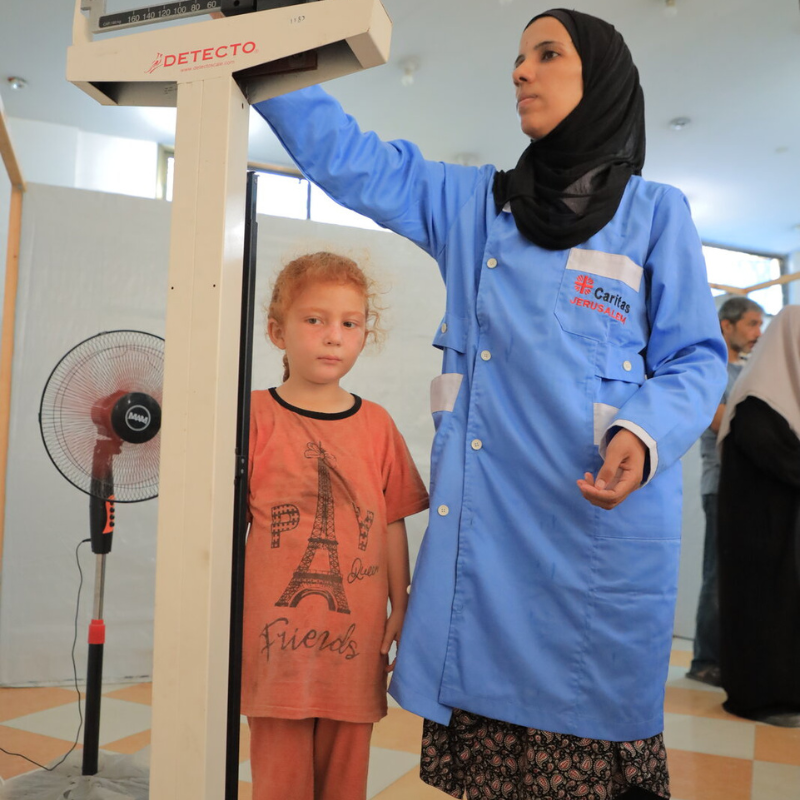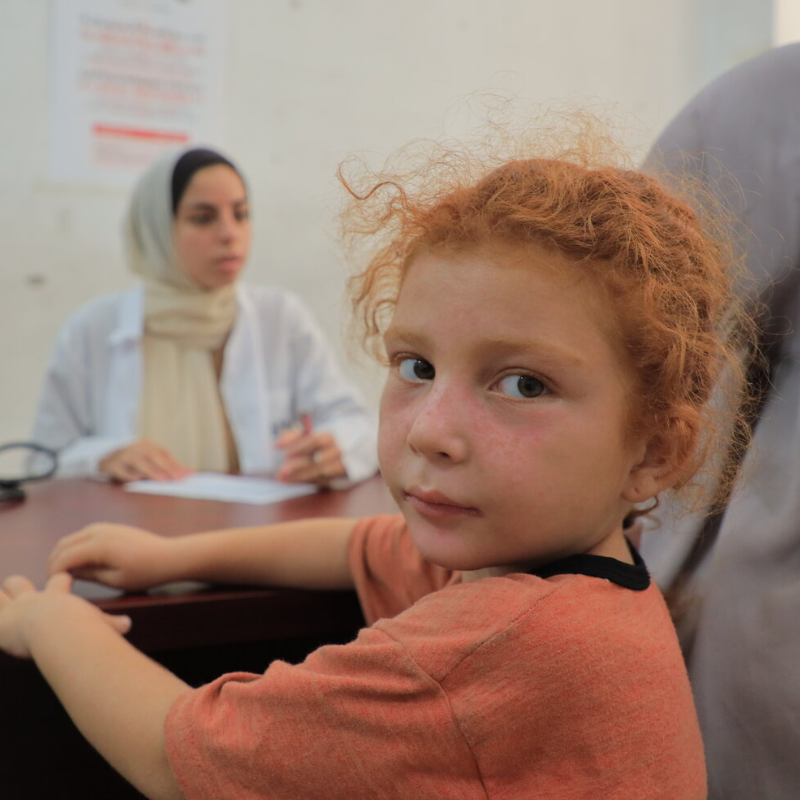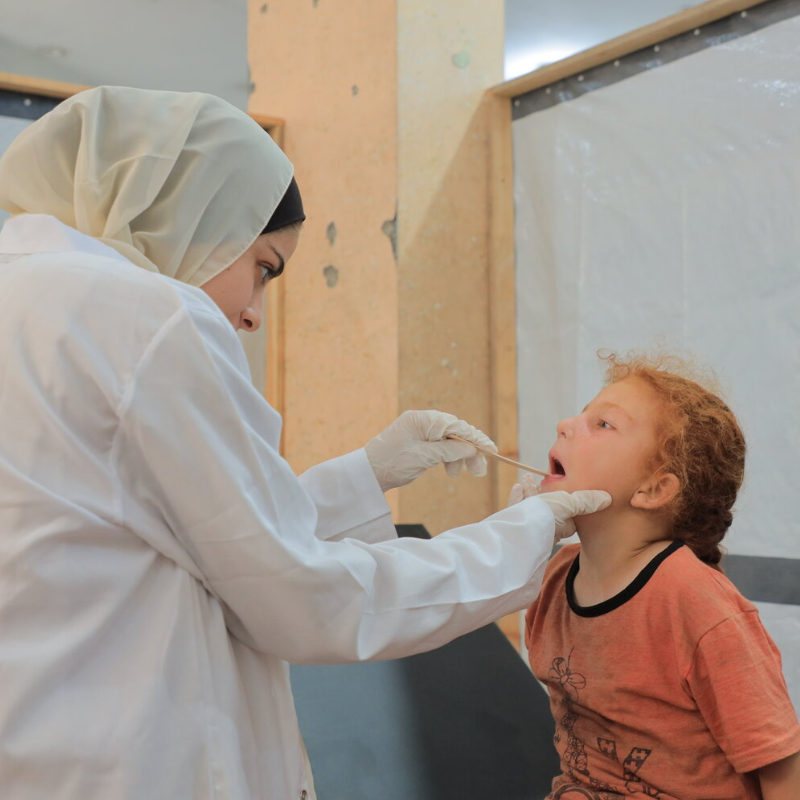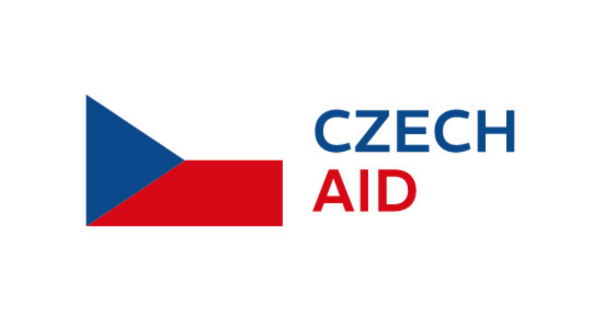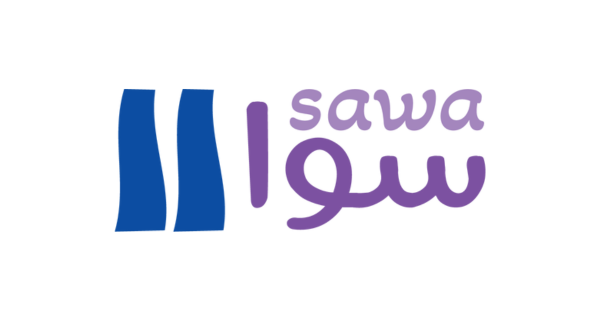Gaza Beyond the Headlines
Documentary Photography Exhibition from the Caritas Czech Republic Clinic in Gaza
The travelling exhibition entitled Gaza Beyond the Headlines offers visitors in Prague and Brno, throughout October and November, a glimpse into the environment of the clinic supported by Caritas in the Gaza Strip. The documentary photographs, created in collaboration with local staff, capture powerful stories of civilians whose health, dignity, and hope are being restored through a joint project of Caritas Czech Republic, Caritas Jerusalem, and the organisation Sawa. The series of authentic images, taken in August of this year, serves as an accompanying documentary component to the Gaza Health Emergency Project II, which provides basic healthcare, psychological support through a free crisis helpline (operated by Sawa), and individual social counselling. The project is implemented with the support of the Ministry of Foreign Affairs of the Czech Republic and donors to the public fundraising campaign Caritas for Gaza.
The exhibition can be visited at the following locations:
Prague
- Church of Our Lady of Perpetual Help and Saint Cajetan*
1 – 31 October 2025
(opening: 1 October at 5 p.m.) - Waldstein Garden, Senate of Parliament of the Czech Republic
6 – 15 October 2025 - Na Příkopech
15 – 29 October 2025
- Kampa
29 October – 12 November 2025 - Czernin Palace, Ministry of Foreign Affairs of the Czech Republic
1 – 10 November 2025
Brno
- Radio Proglas
(Olomoucká 7, Brno)
5 October – 10 November 2025
*Venue provided by Archdiocesan Caritas Prague
Gaza on the brink of survival
Since October 2023, life in Gaza has been turned upside down. What began as a wave of violence as a reaction to the terrorist attack on Israel on October 7, 2023, by the terrorist organisation Hamas, quickly escalated into one of the most devastating chapters in the region’s history. By mid-June 2025, nearly half of the hospitals in Gaza had either ceased to function or were barely operational. More than 92% of homes have been reduced to rubble, and over 1.9 million people, primarily civilians, have been forced to abandon everything (often multiple times) in search of safety that seems nonexistent.
Hunger has added another harrowing layer to this crisis. According to the World Health Organisation and the United Nations, starvation and famine are no longer distant fears. Clinics treating severe malnutrition are overcrowded, under-resourced, and running low on fuel. The statistics are alarming, but behind each figure is a name, a face, and a family. Many NGOs have already issued a repetitive collective warning about the starvation in Gaza in light of the blocking of humanitarian aid. The global Caritas network, Caritas Internationalis, described the crisis not as a tragic accident, but as the result of a deliberate strategy to destroy human lives.
At the end of August, the Israeli army began gradually occupying neighbourhoods in Gaza City. A full evacuation of the city was ordered soon after, with approximately one million people still present at the time. In mid-September, a large-scale ground offensive was launched. Dozens die daily as a result of attacks. Those who remained or had recently lived in Gaza City are surviving in the ruins of buildings or in makeshift tents, without access to sanitation, clean water or electricity. The lack of clean water is contributing to the spread of disease, particularly among children, who are suffering from digestive issues, skin infections and respiratory problems.
Caritas Czech Republic in Gaza
Primary health care clinic
In the heart of war-torn Gaza, Caritas Czech Republic, in cooperation with Caritas Jerusalem, provides essential medical care to those in greatest need. Until recently, a clinic supported by Caritas Czech Republic treated around 60 to 80 patients daily, offering basic health services, vital medication, and psychological support.
However, due to the rapidly deteriorating security situation and increasing attacks in the area, the clinic has been forced to suspend its operations. Caritas Czech Republic continues to closely monitor developments and regularly assesses the safety of its staff. A new location has recently been identified where the clinic could potentially resume its operations, pending further security evaluations.
Husam´s story of recovery
Husam (15) lost his home early in the war and now lives with over 20 people in a torn tent with no clean water, food, or toilets. The harsh conditions and constant hunger have taken a toll on his health and spirit. When he developed severe abdominal pain, doctors at a local clinic diagnosed appendicitis and arranged urgent surgery—just in time. “I thought I would die in the tent,” he said, but he managed to recover thanks to the doctors at the clinic supported by Caritas Czech Republic.
24/7 Crisis helpline
More than 22,000 people from Gaza contacted Sawa´s crisis helpline in the second quarter of 2025. Callers speak of deep trauma, fear, and desperate efforts to protect their children. Telephone operators not only listen to callers, but also offer them additional support services and contacts for places where they can get help. Caritas Czech Republic supports the operation of the crisis helpline and is also involved in training and educating its staff.
Ama´s story
Amal (28), a mother from Gaza, reached out to the Sawa helpline during a time of deep uncertainty—her husband was missing, and she was left to care for their children alone. Through regular calls, she found a space to express her pain and fear. With support, she connected to an organisation that helped locate her husband, who was alive but imprisoned. Months later, Amal called with joyful news: her husband had been released and was finally home.
Individual support - case management
The most complex cases are discreetly referred to the case manager by the primary health clinic or the Sawa crisis helpline. Working in close cooperation with local partners, the case manager ensures prompt and coordinated assistance – from safe shelter, food, and hygiene supplies to psychosocial and legal support. Thanks to this coordination, assistance reaches even the most vulnerable people who would otherwise be left without any support.
Aida´s story
Aida (41) lost her husband during the war in Gaza and was displaced with her five children more than 15 times, facing hunger, violence, and extreme trauma. After months of living in denial and physical pain caused by stress-induced autoimmune diseases, she was referred to mental health services. Aida experienced severe panic attacks, but through two months of consistent psychosocial support at the clinic, her symptoms gradually disappeared. “This is the first time in my life someone has listened to me, respected me, and cared for me,” she said, describing the relief as if “ice had melted from her chest.” Her story highlights the life-changing impact of compassionate mental health care in crisis settings.
Stories from the Caritas Czech Republic Clinic in Gaza
Bara´a (15 years old)
At just 15 years old, Bara’a has become both a sister and a mother. Her two little brothers—Ahmad, 5, and Mohammed, 2—cling to her for everything, because their parents are no longer there to protect them.
Since October 2023, the family has been displaced more than 15 times within Gaza City. They have sought shelter in schools, abandoned buildings, and makeshift tents. In Shuja’iyya, they believed they had found safety in a UNRWA (United Nations Relief and Works Agency for Palestine Refugees in the Near East) school, but then armoured vehicles surrounded the area. Soldiers stormed in, shouting and arresting men and boys over the age of 16. On that day, Bara’a’s father was taken, and she still does not know where he is.
During another displacement, tragedy struck again. Bara’a’s mother was killed before her children’s eyes. “I saw my mother fall, I couldn’t move, I couldn’t breathe,” Bara’a whispered. From that moment on, she carried the entire burden of survival.
With no income, no protection, and two small boys crying from hunger, Bara’a resorted to begging on the streets. Sometimes, neighbors gave her bread, and sometimes strangers handed her scraps. Often, they went days without food. They lived in a torn tent near her aunt’s shelter, sleeping on the ground, without safety or sanitation.
At night, my brothers wake up crying. They ask for our mother. I don’t know what to tell them,
she said.
When Caritas Jerusalem’s clinic, supported by Caritas Czech Republic, learned of her case, a case manager intervened. Bara’a received psychosocial support to help her cope with trauma, fear, and overwhelming responsibility. The children were referred to a partner organisation specialising in child protection. There, they found not only food and clothing, but also safety and care.
For the first time in months, Bara’a felt she could breathe.
Now I don’t have to beg. My brothers have food, and I can sleep without being afraid they will starve,
she said.
Her story is one of unimaginable loss, but also of resilience. A child forced to grow up too soon, Bara’a carries both grief and hope—proof that with protection and care, even the most broken childhoods can find shelter again.
Hamdi Barakat (36 years old)
As we stepped into the tent, the first thing that warmed our hearts was the gentle smiles of the children. Though they seemed a bit fragile, those smiles held a spark of strength as they tried to mask the weariness from the heat, hunger, and illness they were experiencing. For a moment, we were reminded just how resilient kids can be—even in the most challenging situations.
Hamdi Barakat, a 36-year-old father, greeted us with sincere apologies, repeatedly insisting he was sorry for not being able to offer more. In reality, he had already given us something incredibly valuable—his trust and the story of his family.
Hamdi is a devoted father of four. His oldest daughter, Hanan, just eight years old, bravely battles epilepsy, brain atrophy, foot deformities, and hearing loss. Mira, six years old, also faces epilepsy and hearing issues. Rima, who is four, was healthy before the war but now struggles with malnutrition. Then there's little Bashir, only nine months old, and Hamdi worries he might be facing neurological problems too; sadly, no doctor has been able to see him yet.
They told me he needs scans,” Hamdi shared quietly, “but where can I go under these circumstances?
Before the war, Hamdi and his daughters were supported by disability care institutions. However, since October 2023, his life has become a cycle of displacement, moving 21 times from one shelter to another, including Al-Shifa Hospital, and finally to tents made from wood and nylon sheets.
Tragedy struck on November 2, 2023, when Hamdi lost his entire extended family—65 loved ones—during a single attack while staying with relatives in the Old City. He also sustained an injury from shrapnel in his hand. Since that day, it’s just been him, his wife, and their children, trying to survive very challenging conditions.
Later, Hamdi and his family were unable to stay with his in-laws anymore, which left them sharing a tent with his uncle near the sea. Each day, he watched as his children cried from hunger, heat, and illness, and his heart ached.
At one point, Hamdi collapsed from sheer exhaustion while visiting Caritas Jerusalem’s clinic, which is supported by Caritas Czech Republic. Thankfully, a compassionate doctor there referred him to a psychologist. With that support, Hamdi received treatment for his injury and access to essential disability services. Now, his children are getting diapers, therapeutic nutrition, and soon, they will have a safer tent in a camp designed to shelter families with disabilities.
With tears of gratitude in his eyes, Hamdi expressed,
I thank you deeply. I never imagined that a simple visit to the clinic would change our lives. For the first time, I feel like someone is truly supporting me and my children.
Rehab (65 years old)
Rehab, 65-years-old mother, has experienced more than ten displacements since the war began. She evacuated from northern Gaza to the south. During a temporary truce, she attempted to return to her home in Jabalia. However, soon after, the bombs and tanks forced her to leave again, this time to Gaza City. Each move was another blow, another reminder that nowhere is safe.
Her life has been defined by loss. Just three months before the war, her husband passed away. Her only son, who had mild intellectual disabilities but was the family’s sole provider, disappeared a few weeks ago when he tried to return north to retrieve some belongings. He has not been seen since.
Since he left, we are starving," Rehab sobbed. “My daughters cry from hunger all day. We haven’t eaten anything for five days. I pray every night for God to take me, so I can finally rest.
Rehab is the sole caregiver of her four adult daughters, aged between 27 and 42, all of whom have severe intellectual disabilities. They cannot care for themselves, and she must help them with everything, including personal hygiene tasks like going to the bathroom. With no cleaning supplies and constant shortages, the burden on her frail body is immense. “All my joints hurt, I am exhausted, and still, I must do everything,” she told the clinic doctor, tears running down her face.
Before Caritas intervened, Rehab and her daughters were living in a bombed-out room covered with blankets, unable to pay the 450-shekel rent, with no food, no hygiene items, and no safety. The stress was unbearable.
When Rehab came to Caritas Jerusalem’s clinic, supported by Caritas Czech Republic, seeking medication for her chronic illnesses, the team quickly recognized the depth of her situation. She was referred to a case manager who arranged emergency support. Through local partners, the family received a safe tent in a closed camp, daily food, clothing, hygiene supplies, and the adult diapers urgently needed for her daughters. Rehab was also referred to specialized mental health services, where she attended five sessions that gave her strength and space to release her pain.
For the first time, I can sleep without worrying about rent or food for my daughters,
she said with relief.
Yet her suffering remains enormous. Caring for four daughters with mental disabilities in a tent and harsh conditions, with no husband and no son, has left Rajaa very tired and vulnerable.
But thanks to coordinated medical and psychosocial support, she no longer feels completely abandoned. Her story is not only about survival, but about dignity restored in the harshest of conditions.
Rami (2 years old)
My name is Rami. I am two years old. I was born into war, and I have never known what peace feels like.
Rami never met his father. His father was killed in the first days of the war, while Rami was still in his mother’s womb. Before he died, the father asked that his unborn son be named after his own father. So Rami was born without a father, to a mother who was terrified, hungry, and traumatised.
From his first breath, Rami’s life was surrounded by fear and displacement. He and his family fled more than 17 times between Gaza City and the north. Hunger, bombing, and cold nights became his earliest memories.
In January 2024, when Rami was just four months old, tragedy struck again. His family hid in a narrow hallway, hoping it would be safer during the bombing. A shell hit the house. His sister Fatima was killed instantly—her head shattered in her mother’s arms.
I held her, but she was gone… and I couldn’t scream,
his mother later whispered.
Ambulances were blocked; no one could come. For two days, the family sat trapped with the body of the baby girl. The grandfather was critically injured but barely survived.
Rami’s mother could not bear the pain. She walked for seven hours to the south, leaving behind her infant son, her daughter’s grave, and her broken family. She later remarried, trying to escape the unbearable trauma.
Rami stayed with his grandmother and grandfather. But grief never left them. When another uncle was killed, his grandmother collapsed from shock and became unable to care for herself or for Rami. His grandfather, sick and frail, tried his best, but life only grew harder.
The family attempted to return home when rumours spread about a partial withdrawal of troops. But the house in Jabalia was later bombed to the ground, killing more than 20 family members, with 12 still buried under the rubble. With nowhere to go, Rami’s guardians pitched a tent on the streets of Gaza City with the help of strangers. The tent was unbearably hot in summer freezing in winter, without a toilet or clean water. They dug a hole beside it to relieve themselves.
When Rami was brought to Caritas Jerusalem’s clinic, supported by Caritas Czech Republic, his condition reflected the immense suffering he had endured. His tiny body was covered in a severe skin infection from the heat and lack of hygiene. He wore a plastic bag instead of a diaper. Malnutrition had weakened him so badly that he could barely stand. His grandmother, shattered and traumatised, clutched him tightly.
He has no one else left. Please, just help him survive,
she said.
The clinic provided urgent care, and Rami was referred to organisations offering malnutrition treatment and basic supplies for children.
His story is not just about illness or loss—it is the story of a little boy who has been displaced, abandoned by circumstance, and carried through grief by a grandmother who refuses to let go.
I was born into war," Rami’s story reminds us. "But I still deserve to live.
Samira (5 years old)
Hello… my name is Samira. I am five years old, from Jabalia in northern Gaza."
I used to be a happy child. I lived in my grandfather’s big house with my parents, my sister, and my uncles. My father, grandfather, and uncles worked in the fields, growing fruits and vegetables to sell in the market. My mother always cared for me—she hugged me every morning before kindergarten, brushed my hair, packed delicious food in my lunchbox, and read me a story before bed.
Then came October 7. The bombs fell everywhere. We fled many times inside Gaza City. My grandfather and father thought it would be safer to return to our home in Jabalia. For two days we stayed. That night, the whole house shook. The sky turned black, and everything was full of dust.
My mother hugged me so tight… I felt her arms around me, and then I felt something warm and wet covering me. It was her blood. She kept holding me, even as she was bleeding, until she didn’t move anymore.
I was badly injured in my head, my shoulder, and the whole right side of my body. At the hospital, they thought I was dead too, but after three days, I woke up. That’s when they told me… my mother’s hug was the last I would ever feel from her. I remember screaming for hours: “Mama! Mama!” but her voice never came back.
Now I live in a tent on the seashore with my grandmother, who is very sick, my grandfather, my father, who has kidney failure, and my little sister. It is so hot, and we are often hungry. “Sometimes I eat only a piece of bread once every five days.”
When my grandmother took me to Caritas Jerusalem’s clinic, which Caritas Czech Republic supported, there was a bombing nearby. I collapsed, crying and shaking until I fainted. The doctors helped me and referred me to psychosocial support and case management. I had nightmares, bedwetting, fear, and terrible memories. At night, I scream because I see it all again. But little by little, the psychologist is helping me. They even gave me clothes and food through other organisations.
I miss my mother’s hug every day. I wish she could still hold me. But I am learning now that other people care for me, too.

